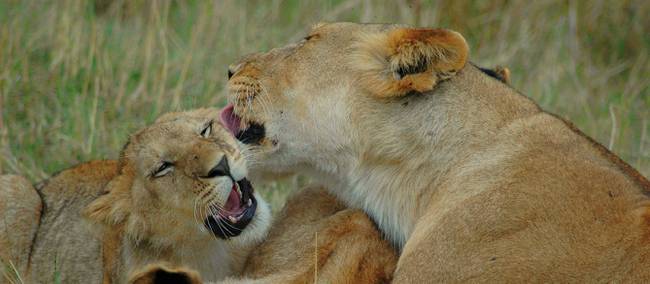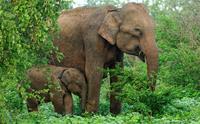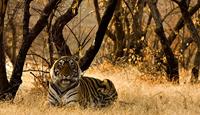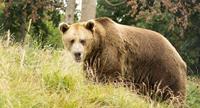
Lioness with cubs in the Masai Mara | Sue Badyari
Blog home / Campaigning for World Animal Protection with Kate Nustedt
 World Animal Protection is a 30 year-old international non-profit organisation with a vision for "a world where animals live free from suffering". We had the privilege of interviewing World Animal Protection's 'International Director of Wildlife Campaign' Kate Nustedt.
World Animal Protection is a 30 year-old international non-profit organisation with a vision for "a world where animals live free from suffering". We had the privilege of interviewing World Animal Protection's 'International Director of Wildlife Campaign' Kate Nustedt.
Kate joined World Animal Protection in February 2014, and works with teams across the world to help protect wildlife that face cruel and intolerable situations. We asked Kate about her motivation for dedicating her career to protecting animals, big campaigns she has worked on, how we can be more responsible travellers and more.
1. Kate, you’ve been working at World Animal Protection since 2014, what was it that motivated you to dedicate your career to protecting animals?
I’ve always loved animals and grew up around them – I could pretty much bump up and down on a horse before I could walk! Over the years, I’ve built lots of campaigning experience by working in politics and with organisations like Greenpeace and ActionAid, and I wanted to put this to good use to help protect animals.
Animals don’t get the chance to speak for themselves – so to speak up for the elephants, tigers, and even the snakes, is important, and a real privilege.
2. In recent years World Animal Protection has led a big campaign to stop tourists riding on the back of elephants. What was it that instigated the campaign?
It was actually someone in the tourist industry in The Netherlands who approached us over five years ago after she’d spent time at elephant venues in Thailand. It’s down to the great relationship that she built with our Dutch campaign manager that transformed the Dutch travel industry, and today not one single operator in The Netherlands offers elephant rides. We’ve built on this approach, and we took this campaign global last year.
 Elephant © World Animal Protection
Elephant © World Animal Protection
3.What research does World Animal Protection draw upon to support their stance on elephant rides?
Our research on elephants has been led by our veterinary expert in Thailand. Over the past five years he’s worked with a team of researchers and visited most elephant venues across Asia and Southern Africa, and assessed the scale of the welfare abuses. This knowledge didn’t exist anywhere before in a systematic way. This first-hand research was complimented by advice, evidence and published reports by other elephant experts and organisations.
Our first report into wildlife entertainment, Wildlife on a Tightrope, published in 2010, helped the travel industry to understand the welfare abuses of wild animals in entertainment, and as a result many have taken action to change their policies and offers.
4. Can you tell us about the success that World Animal Protections' Wildlife, Not Entertainers campaign has achieved?
Over 100 travel companies across the world have so far committed to stop promoting and selling elephant rides and shows. And almost 750,000 people have joined our movement and taken a Wildlife – Not Entertainers campaign action in the last year. This has grabbed the attention of the media and the tourist industry, and is resulting in a shift away in demand for elephant rides and shows in significant markets. Of course, we’ve still got a long way to go…but we’ve taken a great step towards our campaign vision for elephants to be wild – not entertainers.
5. Apart from elephants there are many other wild animals that are used as a source of entertainment in the tourism setting. What other wild animals is World Animal Protection campaigning to protect?
It’s very sad to say but there’s over 550 million wild animals currently being cruelly abused in wildlife entertainment. We revealed the ten cruellest wildlife activities in our Checking Out of Cruelty report earlier this year. In addition to riding elephants, this includes tiger selfies, walking with lions, holding sea turtles and visiting dolphinaria. We’re campaigning against all forms of wildlife entertainment. Our latest campaign was against tiger selfies.
 A wild tiger sitting on the dry grasses in a reserve in India. © iStock. by Getty Images
A wild tiger sitting on the dry grasses in a reserve in India. © iStock. by Getty Images
6. What role do travel companies play in supporting your animal welfare campaigns?
They are very much at the heart of our campaign, whether they like it or not! In the case of companies like World Expeditions it means that we’re working closely together to change the wildlife tourism for the better. But in the case of Trip Advisor, who are promoting and profiting from cruel wildlife tourism, we’re mobilizing our supporters to demand they stop. People love animals and many want a once in a lifetime experience with a wild animal on their holiday.
We’re thrilled that World Expeditions is leading the way in helping tourists to have these incredible experiences that not only do no harm to the animals, but will also benefit wild animals. World Expeditions plays a critical role in helping tourists to be wildlife-friendly.
7. What can every day travellers do to ensure they are not contributing to the problem?
Very simply, if you can ride, hug or take a selfie with a wild animal, it’s cruel – don’t do it. World Animal Protection also has an Animal-Friendly Travel Guide for Tourists.
 Bear © AMP
Bear © AMP
8. During your time with World Animal Protection what has been your biggest ‘win’ in regards to protecting vulnerable animals?
Every animal is a win, whether it’s a bear that we’ve been able to rescue and give a better life to in a sanctuary, or a seal disentangled from fishing nets and re-released into the ocean.
We’re really trying to achieve change at scale – so the day the 100th travel company committed to stop selling elephant rides and shows was cause for a big celebration!
9. World Expeditions and World Animal Protection have just launched amazing adventures that give travellers the opportunity to experience animals in the wild in Kenya, Thailand and India that are doing remarkable work to ensure the welfare bears and street dogs. Which of these trips appeals to you the most and why?
To see wild animals free in the wild is one of the most magical experiences in life.
I was lucky to live in South Africa and had some amazing wildlife experiences. I’ve never seen a tiger in the wild so I’d probably have to go for India in the hope of making this dream come true.
 Dog © World Animal Protection
Dog © World Animal Protection
10. Last but certainly not least, Kate can you tell us what is your favourite animal and why?
They say a dog is a man’s best friend, and it’s certainly this woman’s too!
Animal Friendly Encounters
World Animal Protection and World Expeditions advocate for wild animals to be kept in the wild, safe from unethical tourism. But we realise that navigating the world of animal friendly travel can be puzzling at times. So, we’ve taken the guess work out of wildlife travel experiences, and joined forces to bring you four carefully crafted itineraries that offer some of the world's best wildlife viewing opportunities.
If animal encounters are high on your list for your next adventure and you want to make sure your experiences aren’t harmful, then these adventures are perfect for you - all come with the stamp of approval from World Animal Protection! To top it off, World Expeditions is donating a percentage of each trip to World Animal Protection to support their work to save animals.
To join World Expeditions for animal friendly encounters, click on the following links: